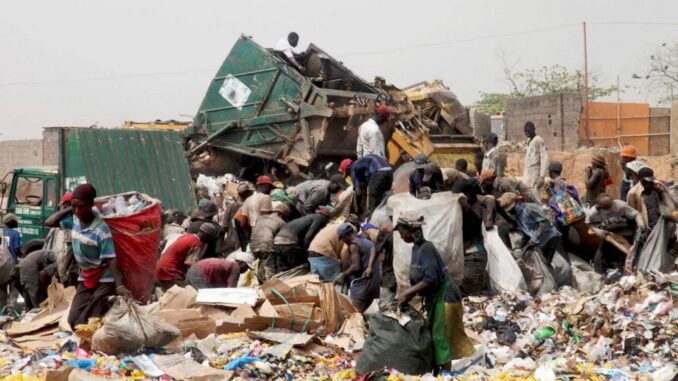
A recent order by the Lagos State Government asking scavengers to vacate refuse dumpsites as part of a strategy to curtail the spread of the deadly Coronavirus is timely and thoughtful. And so, those concerned should comply in public interest. The ravaging Coronavirus pandemic calls for caution in the way we do things. Everyone is at risk and is expected to play safe to remain in good health since contracting the disease could lead to fatalities.
The order came in a statement by the Commissioner for the Environment and Water Resources, Tunji Bello, who directed the Lagos Waste Management Authority (LAWMA) to stop scavenging at the various dumpsites.
The Commissioner said LAWMA must ensure that only PSP operators are allowed on dumpsites to discharge refuse and depart immediately. The Commissioner added that no form of unwholesome business would be allowed to thrive on any of the dumpsites and that no gathering either formal or informal by PSP operators must be permitted on the sites.
But while the order is commendable, the question is: why dumpsites still exist. Why should scavengers find the dumpsites valuable and beneficial? This is a question the authorities should address.
The fact that the dumpsites yield economic value to the scavengers shows that the state is yet to get it right with regards to refuse collection and disposal. This is strange given that the subject is as old as the state. The dumpsites merely advertise the crude method by which refuse is being managed in the state and indeed the entire country.
If garbage were properly sorted out as it is done in the modern times, there won’t be this challenge of asking scavengers to quit. For instance, if different categories of waste materials are separated and properly disposed the scavengers would be left with nothing to collect. Until that is done, it would be difficult to restrain the scavengers, irrespective of the dangers they may face.
Meanwhile, while the directive is in order, the Commissioner needs to clarify whether or not the restriction of the scavengers is a temporary measure, ostensibly in response to the COVID-19 pandemic.
Otherwise, what happens the morning after the pandemic? Would the restriction be lifted for the scavengers to resume their normal activities or is the Lagos State Government going to change its present method by adopting the global best practice in refuse collection and disposal?
There is no doubt that Lagos State had done well in the area of waste disposal and environmental sanitation. Since 2007 when the Fashola administration assumed power in the state, waste disposal bar was raised. But there have been some challenges of reform of the process. Though, the tempo has varied from one administration to the other, the undying consciousness that solid waste management is a major problem that must be tackled in Lagos should remain unshaken. There should be no half measures, in this regard if the city must be habitable with the teeming population. That is why no administration should allow Lagos to return to the era of filth and indiscriminate garbage dumpsites.
There was a time garbage trucks operated by private sector concerns (PSP) were deployed to practically all the nooks and crannies of Lagos to evacuate refuse every other day. This was followed with the deployment of street sweepers on the major roads. Thousands of street sweepers were engaged and deployed to major roads in the city. There was also a weekly environmental sanitation by traders and shop owners. Besides, there was another general monthly environmental cleanup, now cancelled following a court verdict that nullified it on the ground that it infringed on resident’s freedom of movement on the sanitation day.
Furthermore, the state government established the Lagos Waste Management Authority (LAWMA), charged with the responsibility of professional waste management in the state. LAWMA’s job by law is collection and disposal of municipal and industrial waste, as well as for the provision of commercial waste services to the State and local governments. But a new environmental law has seen LAWMA transit from refuse collection and disposal to a regulatory body. It is not yet clear how the new law, which has stripped the body of its operations, has made things better.
There should, therefore, be an urgent performance evaluation. Are the PSP operators well equipped to implement efficient refuse collection? The evaluation will address why refuse is not sorted out before disposal, which is the major reason scavengers will always be attracted to the dumpsites.
END

Be the first to comment